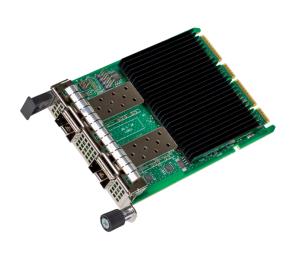Cart
- Cart Empty!
- Appliances
- Electronic Components
- Software Esd
- Audio/ Video/ Multimedia
- Books
- Cables & Accessories
- Communication & Networking
- Controller & Interface
- Imaging & Photography
- Input Devices
- Monitor & Display
- Motherboard/ Memory/ Processor
- Notebook/ Tablet Pc/ E-book
- Pc & Workstation
- Power Components & Protection
- Printer/ Aio/ Copier/ Fax
- Projectors
- Servers
- Software
- Storage
- Telephony/ Handhelds
Every effort has been made to ensure the accuracy of all information contained herein. e-nitiative shall not be liable for any changes resulting in wrong product description, tax code and/or price. The shown information (specifications, prices, taxes) should be considered as an indication and can be changed at any moment and without any prior notice.
ADVANCE COMPUTER CENTRE LTD
59 GEORGE LANE
E18 1JJ LONDON
UK
Telephone : 02085188353
VAT : 506794623




Ethernet Network Adapter Pci-e E810-xxvda2 For Ocp 3.0
£256.73
| Part Number: | E810XXVDA2OCPV3 |
| Language: | IN |
Product Details
Introduction
iWARP/RDMA
iWARP delivers converged, low-latency fabric services to data centers through Remote Direct Memory Access (RDMA) over Ethernet. The key iWARP components that deliver low-latency are Kernel Bypass, Direct Data Placement, and Transport Acceleration.
IntelŽ Data Direct I/O Technology
IntelŽ Data Direct I/O Technology is a platform technology that improves I/O data processing efficiency for data delivery and data consumption from I/O devices. With Intel DDIO, IntelŽ Server Adapters and controllers talk directly to the processor cache without a detour via system memory, reducing latency, increasing system I/O bandwidth, and reducing power consumption.
PCI-SIG* SR-IOV Capable
Single-Root I/O Virtualization (SR-IOV) involves natively (directly) sharing a single I/O resource between multiple virtual machines. SR-IOV provides a mechanism by which a Single Root Function (for example a single Ethernet Port) can appear to be multiple separate physical devices.
Flexible Port Partitioning
Flexible Port Partitioning (FPP) technology utilizes industry standard PCI SIG SR-IOV to efficiently divide your physical Ethernet device into multiple virtual devices, providing Quality of Service by ensuring each process is assigned to a Virtual Function and is provided a fair share of the bandwidth.
Virtual Machine Device Queues (VMDq)
Virtual Machine Device Queues (VMDq) is a technology designed to offload some of the switching done in the VMM (Virtual Machine Monitor) to networking hardware specifically designed for this function. VMDq drastically reduces overhead associated with I/O switching in the VMM which greatly improves throughput and overall system performance
Ports & interfaces
Host interface
PCI Express
Ethernet LAN (RJ-45) ports
2
Fiber optic connector
SFP28
PCI version
4.0
Network
Ethernet LAN data rates
1000,10000,25000 Mbit/s
LAN controller
Intel E810
Design
Internal
Y
System requirements
Compatible operating systems
https://www.intel.com/content/www/us/en/support/articles/000025890/ethernet-products.html
Other features
Cable type
SFP28 ports - DAC, Optics, And AOC's
Intel Virtual Machine Device Queues (VMDq)
Y
PCI-SIG* SR-IOV Capable
Y
On-chip QoS and Traffic Management
Y
Intel Flexible Port Partitioning
Y
Speed & slot width
16.0 GT/s, x8 Lane
Intelligent Offloads
Y
iWARP/RDMA
Y
Intel Data Direct I/O Technology
Y
Intel Virtualization Technology for Connectivity (VT-c)
Y
Storage Over Ethernet
iSCSI, NFS
Launch date
Q3'20
Network interface card cable medium
Copper
Network interface card type
Server
Status
Launched
Processor family
800 Network Adapters (up to 100GbE)-800 Network Adapters (up to 100GbE)
Harmonized System (HS) code
8517620090
Export Control Classification Number (ECCN)
5A991
Commodity Classification Automated Tracking System (CCATS)
NA
Bracket height
OCP 3.0
Product series
800 Series Network Adapters (up to 100GbE)






















